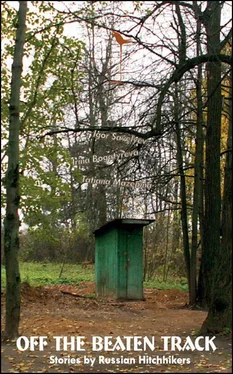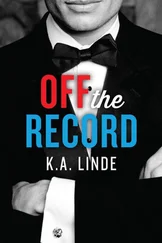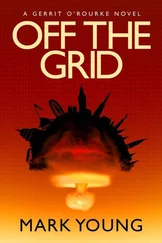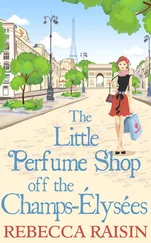Igor Savelyev, Irina Bogatyreva, Tatiana Mazepina
OFF THE BEATEN TRACK
Stories by Russian Hitchhikers
Igor Savelyev
THE PALE CITY
The same question must have tormented everyone who ever sat down with a blank piece of paper in front of them: where should I start? Logically, of course, it would make sense to start with a bit of history. But I’m no good with historical data and wouldn’t do a particularly good job of describing the city where I was born and used to live. To be honest, it’s probably just as well. You don’t need to know that this story happened specifically in Ufa, capital of Bashkiria. All you need to know is that it’s set in a moderately industrial city in the Urals, on the banks of the Volga, with a population of just over a million, five theatres and a state circus. How many museums? I can’t remember. See, I’d make a terrible historian.
How would a proper historian describe the city today? He (or she) would probably start by waxing lyrical on the subject of the rivers, and how they “carry their abundant waters past the white stone walls”. Well, I’m going to start at the city limits, where a sign saying UFA lets you know you’re entering a built-up area. Please refrain from sounding your horn, driver — you’re not on the highway now.
Incidentally, the sign is bilingual; Ufa in the Bashkir language is ‘Ephe’. Not the most attractive name for a city, I’m sure you’ll agree, but we’re used to it. And since we live in Ephe, are we modern-day Ephesians?
There’s nothing between the sign and the police checkpoint, and this is typical of Ufa. Anyone who’s ever visited one of the other regional capitals in the Urals — Chelyabinsk or Ekaterinburg — will know what I mean. In both these cities there is a cemetery running alongside the road at this point, like a kind of tribute to city life: rows of white headstones, apparently made of breeze blocks… There’s nothing remotely depressing about these cemeteries. They’re like miniature replicas of the suburbs. Everything about these sprawling metropolitan churchyards seems to say, “Greetings and welcome, dear visitors!” It’s always amusing when the city authorities hang a banner bearing words to this effect on the fence separating the cemetery from the road, and you’re never quite sure whether you’re being welcomed to the city or the afterlife.
At least the cemetery isn’t the first thing you see as you approach Ufa, and that has to be a good thing, right?
So, what else can I tell you? There are basically two sides to the city. The first is the centre, where everything’s very charming and picturesque: cobbles, boutiques, shop windows, bright lights, and plenty of people strolling about. The main street is named after You Know Who. Sometimes when you notice the street signs you can’t help remembering that Vladimir Lenin chose his pseudonym in honour of the river Lena in Siberia, where he served his exile. Imagine the alternatives: Amurin, Irtyshin, Enisenin… He had plenty of rivers to choose from!
To put it into context, the names of nearly all the streets in the centre of Ufa are connected in some way or other (most of them directly) to all that Marxist-Leninist nonsense. It’s the same in every ex-Soviet city. At least Ufa doesn’t have a street named after 1937, like they do in Saratov. The peak of the Great Purge. But seriously: Twentieth Anniversary of October Revolution Street, that’s what it’s called.
Anyway, as I was saying, there are worse places to hang out than our city centre. You can buy ice cream here on every street corner, and on a hot summer’s day there’s nothing like it. You take your cone and the ice-cream seller hands you your change, which is also kept in the freezer for some reason. A few frozen coins. It’s nothing, really, but it’s a nice feeling.
The rest of Ufa is industrial — home to the major Bashkir oil refineries (plus a dozen or so derivative petroleum factories) and whole districts of squalid, soot-covered Khrushchev-era apartment blocks, which are inhabited by blue-collar workers with bluish faces. It’s nothing to do with chemical poisoning — they just drink too much. That part of the city is where the famous rock singer Zemfira comes from, by the way. Zemfira: the leading exponent of Russian aggro-rock. When she launched her first album (like a missile), the cover was a photographic image of dilapidated factories and crooked chimneys in a haze of pearly-white chlorine cyanide smoke. Views just like this could be seen from anywhere in the centre of Ufa. The locals knew the best vantage points and were always happy to share them with visitors, who would never fail to be impressed by this evidence of our connection to the world-famous rock star.
This imposing industrial zone identifies our city as part of the Urals; you don’t get views like this in any of the other cities along the Volga. When I visited Samara I saw just one tall chimney on the city skyline. It really stood out. I found out later that it wasn’t actually a chimney at all but an enormous rocket-carrier, a monument to Sergei Korolev, a key figure in the Soviet space programme.
To give you a better feel for the city, let’s take a walk around and eavesdrop on a few of the locals.
An elderly spinster, looking up at a billboard…
“That’s Sandra Bullock! A famous actress!” she exclaims before adding, profoundly, “I used to look just like her…”
The local recreational park, early evening…
Two friends are larking about, smoking grass, wandering around one of the glades and urinating wherever they feel like it. Already stoned, they’re squealing with high-pitched laughter. A middle-aged man carrying two bottles of wine hears the laughter coming from behind the bushes.
“Would you like some company, ladies?” he calls out.
“There aren’t any ladies here, old man!”
A girl suffering from claustrophobia, her first time in a solarium… Before clambering into the sarcophagus she turns to the nurse and asks in a panic, “What’s your name? Just in case…”
“Why do you want to know? I’m not usually on first-name terms with the clients. Weird… Well, since you ask, it’s Larisa, and I finish at half past five!”
A conversation in a food shop…
A drunk rushes over to the counter of the wines and spirits section.
“Now for the most important purchase! I need a bottle of vodka. Just the one, but make it a good one, the kind you’d give to your son!”
“I’d clout my son over the head with any vodka bottle!”
The drunk is speechless…
The next customer is a young man of about twenty who looks like he doesn’t give a damn. Prominent cheekbones, dirty shoulder-length hair, scruffy old clothes… that pretty much sums him up. Yes, this is where you get to know one of our main characters. Officially his name is Mikhail, but everyone calls him Squire. Everyone, that is, except his university professors and a couple of other clueless old fogies. Like his parents, for example.
“A large can of Shikhan lager, please. Yeah, extra strength. Thanks…”
His parents are out of the picture. They still live in Sibai, a small Bashkir town in the middle of nowhere — a typical provincial backwater.
Squire arrived in Ufa four years ago to take up a place at the Aviation Institute. He started his course, and everything was fine, but he wasn’t really interested in studying… From the very first day he was blown away by the metropolis, charmed and smitten, once and for all. The city had it all! There were lots of places to hang out, like the ‘pipes’ — underground passages that had attained a kind of cult status. They were neglected and filthy, covered in Dutch tiles and full of soggy cardboard; he could spend hours in there, screwing up his eyes as he emerged into the unexpected sunlight. Nobody bothered him or interfered in his business. In fact, the only thing missing in Ufa was anyone who cared what he got up to, and that suited Squire down to the ground! A big city is never dominated by any one group — that’s the curse of provincial backwaters.
Читать дальше












